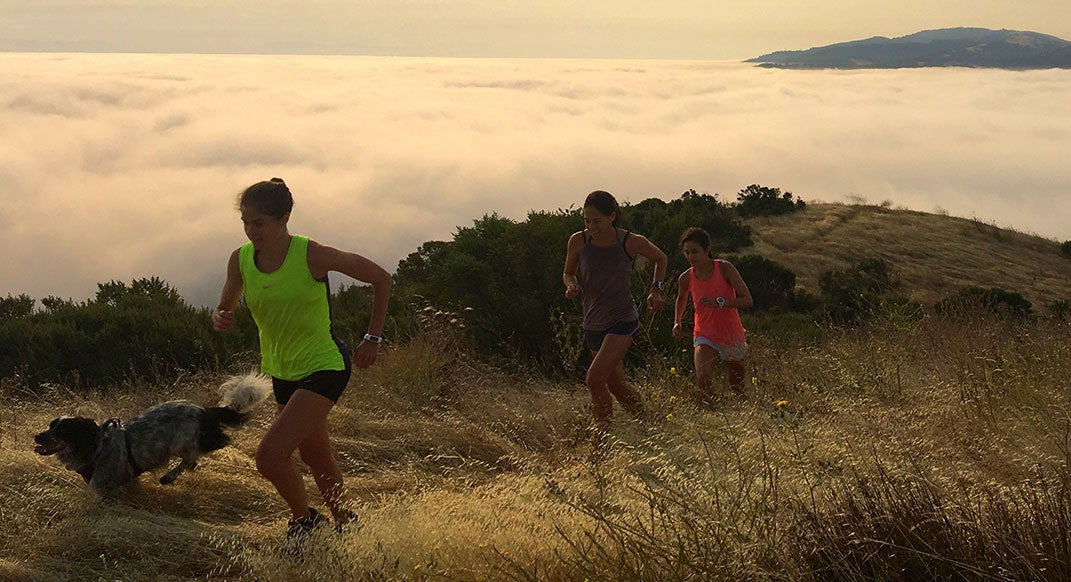Trail Runners Are Crazy. Make It Work for You

Many of us are crazy. And that is OK.
Running is a grueling, mostly solitary pursuit that requires a strange type of persistent motivation. For a serious runner, that motivation needs to survive terrible injuries, catastrophic failures and life-threatening nipple chafing. While trail running does have a lot of rainbows and butterflies, it also has its fair share of lightning strikes and monsters.
What type of person persists when others move onto a kinder hobby, like knitting or Netflixing? In my coaching experience, those of us who decide to be lifelong runners make up a strong-willed herd of free-range wackos.
Being full-blown looney tunes about running has its positives. It allows us to accomplish amazing things when others would have stopped many years and up to two intact nipples ago.
But it also has its downsides. We can think too much, overanalyze things and even sabotage our health and happiness. We all know of runners whose obsession has had tragic consequences, encompassing everything from shorter-term injuries and discontentedness to longer-term, life-altering issues like overtraining,eating disorders and depression. The same thing that makes us great and fulfilled can make us unhealthy (and hurt our performance).
It’s essential to lift any stigma associated with this way of thinking so we can confront our crazy and try to keep the benefits while avoiding potential pitfalls. Here are two questions to ask yourself every day to make sure you keep your relationship with running healthy and happy.
1. Think long-term.
How can I make myself a happy and healthy runner three years from now?
In running, daily decisions determine long-term health. It’s easy to fall into the trap of thinking solely about a workout later in the week, or a race a few months away, instead of thinking more about the adventures in years to come.
Short-term planning like this causes people to run through injuries, do workouts they don’t want to and ultimately develop a purely results-oriented perspective that rarely leads to long-term fulfillment.
I recommend the three-year plan. Whenever you make running-related decisions, ask yourself whether it will make you better in three years. With this perspective, you won’t push through injuries, worry too much about missing a workout or overtrain.
When I met Corrine Malcolm in 2014, she was coming off a series of major injuries as she transitioned from elite biathlete to elite trail runner. We sat down and made a three-year plan together, with a focus on long-term development over immediate trail-running success.
At first, we kept Corrine’s mileage lower than we could have, and the workouts weren’t quite as tough. The goal was solely health and running-specific aerobic development. She probably sacrificed just a bit of her potential in 2015 due to the conservative approach.
Then, in 2016, she reaped the rewards of long-term thinking. A year ahead of schedule, Corrine won the US 50 Mile Trail Championships by prioritizing consistency over short-term success. Most importantly, using this approach, we are both excited to see where running takes her in another three years.
2. Keep perspective.
What does running mean to me and why?
On our fridge, my wife and I use Post-It Note reminders. While our to-do list and grocery needs change constantly, our running goals always stay the same. That Post-It just says, “Fudge it. It doesn’t matter. So have fun and enjoy the process.” (Actually, it doesn’t say “fudge,” but you get the idea.)
Across the elite athletes I coach, I have found that those who have had the “Fudge It” moment in their running careers generally have a healthier relationship with running. We all run for a lot of different reasons, all of which can be valid. But at the end of the day, it only has the meaning you give it. So sit down and choose the meaning it has for you.
Clare Gallagher, who won the Leadville Trail 100 over the weekend, put it wonderfully in a recent interview. When asked about her thinking when running 100 miles for the first time, she said, “My main goal was to remember not to take myself too seriously. Climate change matters and democracy matters. Community and family matter. This doesn’t matter.”
Not being overly serious allowed Clare to smile her way to the second-fastest time in the history of the race.
So learn to strategically embrace your running crazy. By lifting the stigma and asking yourself the big questions, you can maximize your trail joy, as well as your performance.
David Roche is a two-time USATF trail national champion, the 2014 U.S. Sub-Ultra Trail Runner of the Year and a member of Nike Trail Elite and Team Clif Bar. He works with runners of all abilities through his coaching service, Some Work, All Play. Follow David’s daily training on Strava here, and follow him on Twitter here.